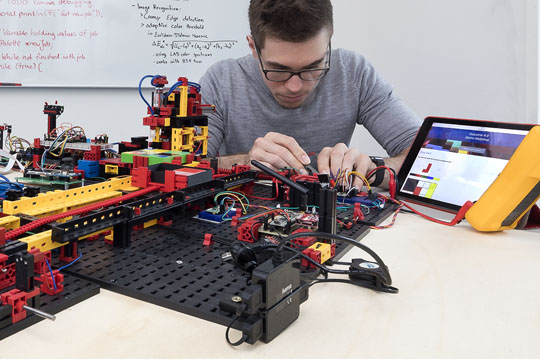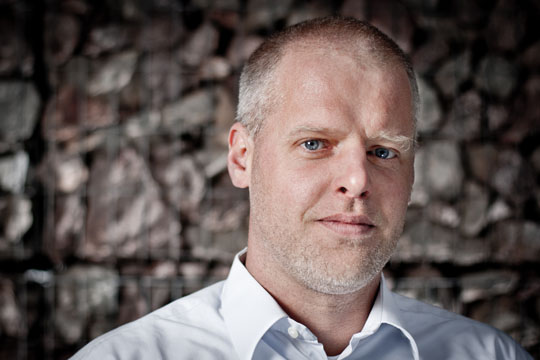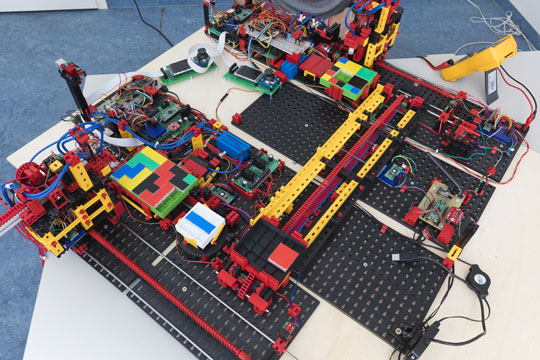„Understanding both worlds"
Freiburg, May 16, 2017
Dr. Tobias Schubert in the Department of Engineering at the University of Freiburg broaches the subject of „Business 4.0" in his teachings: in the areas of IT and Embedded Systems Engineering as well as the on-the-job training „Intelligent Embedded Microsystems," he clearly benefits from his interactions with the business world. Sabrina Reinshagen spoke with him about the changing demands facing engineers today.
 Photo: Jürgen Gocke
Photo: Jürgen Gocke
Herr Schubert, you got your degree in Computer Science and Microsystems Technology at the University of Freiburg in the 90s. Today you can study both subjects in an integrated field called Embedded Systems Engineering. What benefits arise from the melding of both disciplines?
Tobias Schubert: It is more realistic nowadays. If you look, for instance, at applicable areas such as the automobile industry, you will find combined aspects of computer science and microsystems technology. In other words, hardware and software go hand in hand. If you wish to work in the business world later, you have to understand both worlds to a certain degree.

Tobias Schubert appreciates students who don't follow the typical career path: „They often begin their studies with more focus and are more prepared to question things."
Photo: Martin Böhnert
What does this combination have to do with Business 4.0?
The core of Business 4.0 is digitalization. It has to do with generating more value from data for the company – for instance, through production automation or new business models. When we talk about the technical realization of Business 4.0, both disciplines play a huge role together. It is no longer enough to be a specialist in one area; you have to know adjacent fields in order to use, analyze and design such intelligent systems.

Drafting and completing an individual product: Students gather practical experience in serving the demands of Business 4.0 with „Smart MiniFab", a model for an intelligent production facility.
Photo: Jürgen Gocke
How does it affect your teaching?
We have to focus much more strongly on skills across multiple systems, which can be difficult when teaching a specific subject area. During my lectures, I try to show how the knowledge can be applied – I give examples of how concepts can be transferred to real-life situations. Internships are a great way to teach aspects across multiple systems. We built, for instance, a model factory that contains the typical components of a Business 4.0 production facility. Using this model, I can offer theoretical input, but the students can develop their own solutions and discover where the stumbling blocks are during the implementation phase.
Which direction will engineers' training take in the future?
I hope they distance themselves from trying to move people into the job market as quickly as possible. Each person's educational background has validity in its own right. The traditional path – high school diploma, bachelor's, master's and level-entry job is certainly not a bad idea. But I also have to do with a lot of students who didn't select the classic path. Either they started a job directly after their bachelor's or did a master's while working full-time or they take specific courses to further their education. There are also students who did an on-the-job training program right after high school who then later decided to pursue a college degree.
Do these students have other prerequisites?
They often begin their studies with more focus and are more prepared to question things. If they doubt my perspective as a teacher, they tell me. It is an opportunity for me to learn about the relevant questions coming from the business world. I find it to be very pleasant: you try to pass on your methods and get feedback about ways in which you can improve the class for your target audience. Teaching feeds off that kind of exchange.
What do you say to objections about the university being too distanced from the realities of the business world?
As a University instructor, I am often confronted with such issues. There may be areas in which it is relevant. But it is more a question of whom I am training and for what: for someone in a company who needs to use and program devices, concepts taught at the university are completely inappropriate. But if we go to a different level, such as the C-suite or in research and development, then we have to teach people how they can solve certain problems. Our program is most appropriate for those people.
Continuing education program Intelligent Embedded Microsystems
Finding solutions to problems: How the intelligent production facility works.
e637e0757e4dff20545e3f29b1b561a3

